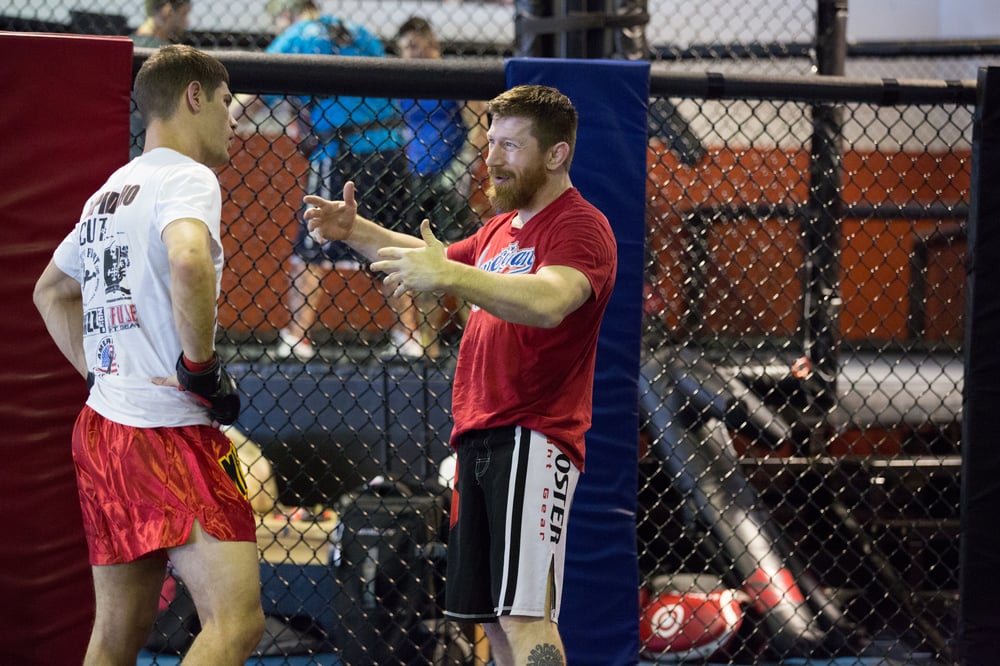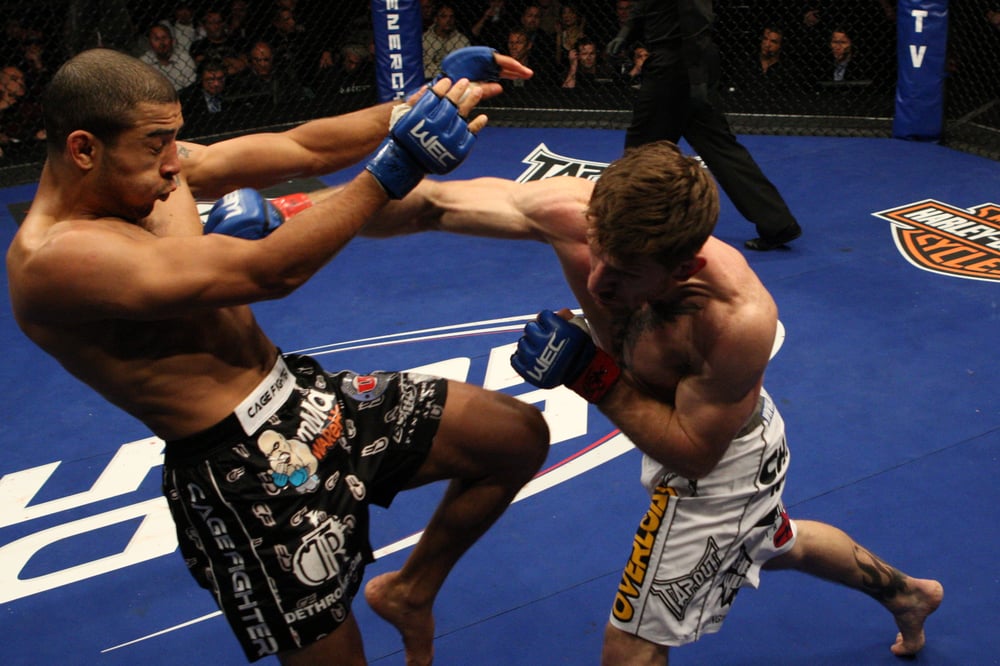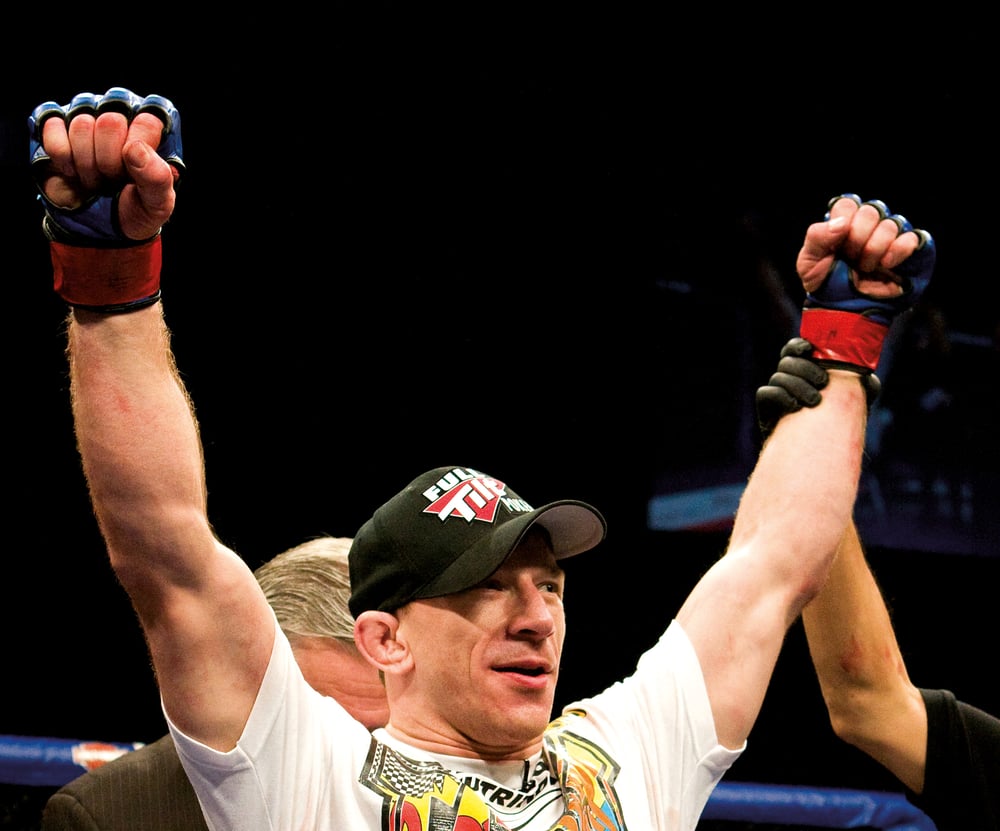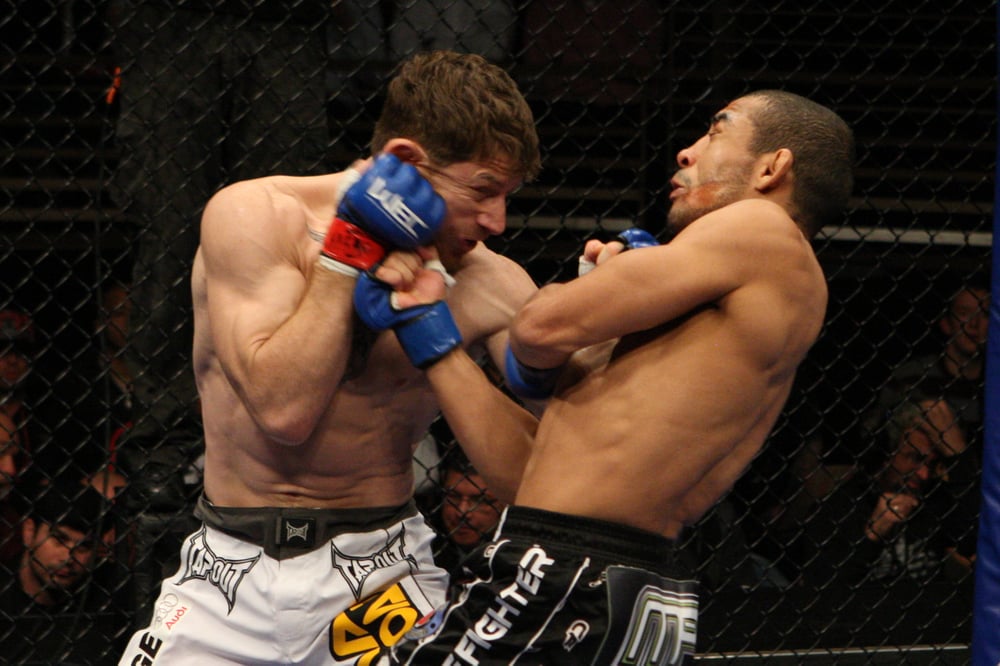
Issue 155
June 2017
Mike Brown has drawn on his experience from a title-winning career to become one of the top coaches in MMA.
The path from fighter to trainer is one walked by many mixed martial artists after their careers are over, but few manage to repeat their in-cage success. Lower still is the number of true former champions from the sport’s modern era that have gone on to guide others to glory. First, there was the UFC original welterweight ruler, Pat Miletich. Now there’s former featherweight top dog, Mike Brown.
MIKE BROWN
- ATT assistant MMA coach
- Former WEC featherweight champion
- Record: 35-9
- Finishes: Five knockouts, 13 submissions
- Notable wins: Urijah Faber (x2), Yves Edwards, Je Curran, Mark Hominick, Leonard Garcia

The native of Portland, Maine, has been a fixture at American Top Team since 2004. A couple of months after he first spent time there, he packed his bags and flew to Coconut Creek, Florida. Not just to train at ATT, but to live and work too.
He was immediately part of the furniture. Brown began life at ATT sleeping in the fighters’ dorms. When he moved into more traditional accommodation, he helped to pay his bills by working on the gym’s front desk. Though he was one of the world’s best pound-for-pound fighters, his purses barely eclipsed what a UFC curtain-jerker would earn now.
Though he wasn’t earning the kind of money that would set him up for life, Brown didn’t give too much thought to a transition from punching mitts to holding them. “I was just chasing a dream,” he says. “I didn’t really think too much of the future. I was just trying to be the best and loving what I was doing.”
But the founders of the team did. They saw their fighter lived and breathed MMA. Not only that, he became their first ever world champion when he knocked Urijah Faber out in the first round to win the WEC title. He was part of ATT history. One of its founding coaches was determined for him to be part of its future, too.
“Ricardo Liborio always said he’d love to have me here. I‘ve always been kind of a fight geek, super into it. I’m a big fan, I’ve studied the game, so I was a good t. I was super happy to make that transition.”

It didn’t happen immediately. Though Brown lost his title to José Aldo after two defenses, he was still one of the major players in the 145lb rankings as the UFC and WEC merged. He was part of the third ever featherweight fight in the Octagon. But that was the beginning of the end of his career as a competitor. When the time to hang up his gloves approached the conversion to coaching happened naturally.
“I think I started coaching part time after I had my last neck surgery,” he says. “I had cervical neck surgery in 2012. I started coaching part time because I was out on the sidelines and couldn’t really go hard anymore. I had one more fight, it didn’t go my way, so I was like, ‘It’s time. I can’t really have one foot in and one foot out.’ It’s not the type of mind frame you need to have as a fighter.”
With both feet in his new discipline, Brown soon became an invaluable part of the ATT training personnel. Fighting was no longer a part of the equation. Even though he feels like he didn’t get a chance to get the full bene t of the sport’s growth in recent years, there are some things he’s happy to leave to the current generation.
“There are some parts of it that I miss and some parts I don’t,” he says. “The one thing I miss is that the checks are getting much bigger now. But I’m happy and content with the past – and definitely excited not to cut weight anymore.”

Being a top-class fighter doesn’t guarantee success in other aspects of the fight game. Brown’s experience at the highest level and ability to do it all in a fight – quick stoppages by knockout and submissions or five-round wars – helped him to excel and earn even more respect from some of the best around today.
“Some parts come easy to me, some parts don’t. I’m not the most outgoing guy, so that’s a part I work on, but I’ve been around the sport a long time and I usually tell people what works for me. I’ve coached wrestling in the past so I have some experience there and I’ve learned a lot from the other coaches at American Top Team. I’ve learned a lot from Ricardo Liborio and Kami Barzini, Katel (Kubis) and Howard Davis – a bunch of great coaches that have mentored me throughout the years. I try to make it my own and show it to the next guy.
“I work a lot with Joanna Jedrzejczyk, Jorge Masvidal, Dustin Poirier, Mirsad Bektic, Kyoji Horiguchi, Colby Covington, Nate Coy... I usually work with who asks. We have so many fighters at the gym, and coaches, too. I try not to push myself on anybody. If somebody comes and asks me for help, I help them. If they don’t ask, I don’t and I keep to myself.
“I think I’m more of a technical guy. I try to set things up as easy as I can for the fighters and then try to help them with technical advice for the most part – game planning and making sure they have the right looks throughout the days. I’m a student of the sport, for sure. I like that and convey that.”
Of course, the fight business isn’t a walk in the park. There can be conflict between a coach and his charge during the intensity of training, though that’s not likely to be on the mat especially with someone as mild-mannered as Brown. But when fight camp is coming to a close and the time comes to hit the sauna to make weight, aggravation can ensue.
Brown explains: “We’ve had situations where guys are completely broken and finished with the weight cut. ‘I’m not cutting any more weight!’ Then we have to play good cop, bad cop. One coach will start hammering on them and giving them the pep talk, pulling them out of the bed and trying to throw them into the sauna. You do what you can do to beat on their psyche to get them back in there. Then you’ll get fatigued and exhausted and another coach will jump in and work their magic.”

It’s hard to imagine Brown as the bad cop, though. So who in American Top Team doesn’t mind being a little more forceful? He suggests the Iranian-American wrestling coach is more suited to the task. “Maybe Kami Barzini. He’s not afraid to be the bad cop. It’s a good chemistry.”
That interaction between coaches with different styles is what has helped ATT produce a raft of champions. It’s also attracted dozens of fighters from all over the rest of the US and the globe to improve.
“We’ve got a lot of great coaches,” Brown adds. “Now it snowballs, man. We get a lot of people from all over the world with different ideas, different techniques and it’s all blending together and the team is as big and as good as it’s ever been.” No wonder you voted it ‘Gym of the Year’ at the World MMA Awards.
American Top Team is one of the elite facilities at a time when the sport is booming. As one of its MMA coaches, Mike Brown is at the forefront of that and he’s loving it. This is what he was made to do. He certainly never had any ambition of doing anything else.
“This was my dream,” he says. “If I was independently wealthy and had $10m in the bank I’d be doing the same thing, I’d just be volunteering and doing it for free.”










